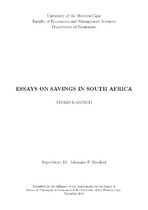| dc.description.abstract | Savings is essential for boosting economic growth. Low savings in a country will have negative
consequences for both investment and economic growth. South Africa has continued to expe
rience declining saving rates and in recent years, accompanied by declining economic growth.
The study evaluated savings in South Africa by decomposing it into household saving, cor
porate saving and public saving. The focus was to investigate the determinants of household
savings, corporate and public savings. In addition to examining the determinants of savings,
the research has also analysed the saving-investment relationship for South Africa. The study
used a Bayesian vector auto regressive model to investigate the determinants of household sav
ing from 1980Q1 to 2017Q4. The results of the investigation on household saving showed that
GDP, inflation rate, and financial deepening determine household saving in South Africa.
The Bayesian VAR was also used to identify the determinant of budget deficit between 1980Q1
to 2017Q and found Real GDP, inflation rate, total government debt, investment by general
government and the inflation rate to be determinants. The Blundel-Bond Generalized Method
of Moment (GMM) was used to investigate the determinants of corporate saving in form of cash
holding for 80 non-financial firms listed on the JSE between 2007 and 2017. The results showed
leverage, cash flow, debt maturity and previous amounts of cash holding to have significant
effect on cash holding in SA. Lastly, the study examined the saving-investment nexus for South
Africa using yearly data from 1980 to 2016. Using the Autoregressive Distributed lag (ARDL)
and the Error Correction Model, (ECM), the study found a cointegrating relationship between
domestic saving and domestic investment. It further found a positive relationship between
domestic saving and domestic investment in both the short and long run. Causality analysis
showed a unidirectional causality from domestic saving to domestic investment. | en_US |

